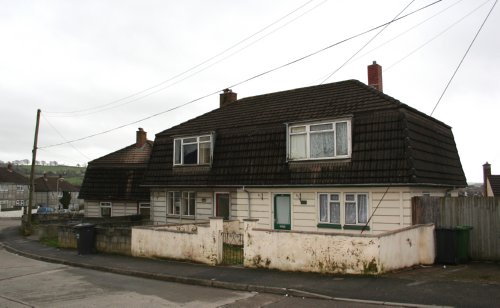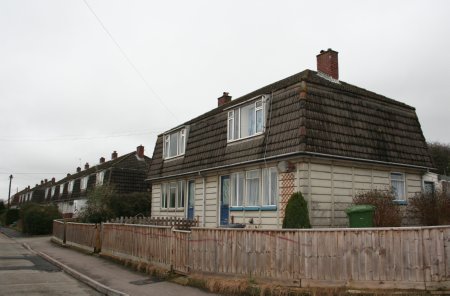 Post-war housing estate, Forches in Barnstaple, is to undergo a complete reinvention as part of the North Devon Council’s Barnstaple Regeneration Programme.
Post-war housing estate, Forches in Barnstaple, is to undergo a complete reinvention as part of the North Devon Council’s Barnstaple Regeneration Programme.
A typical example of the cheaply produced, prefabricated housing which sprung up around the country as a response to the post-war housing shortage, the pre-cast reinforced concrete dwellings which currently constitute Forches are falling into disrepair. Now it is one of three sites in Barnstaple where the Council has pledged to demolish over two hundred homes and build three hundred and fifty high-quality replacements.
Work on Phase 1 of the project commences this year, with a provisional completion date of January 2013, which will see sixty-five two- and three-bed family homes constructed for the social landlord, although the contractor has indicated that it may be possible to finish earlier. The programme is being delivered by main contractor Frank Haslam Milan (FHM, a delivery company for regeneration specialists Keepmoat) for North Devonshire Council in association with North Devon Homes Ltd. (NDH). Design services were provided by the Trewin Design Partnership.
James Trewin, Partner at the design firm, said that despite the tight time-frame and the challenges presented by the regeneration sites, the planning stages were completed to high standards. Clearly for this all-new Forches, though being delivered under time and economic pressures like the original estate, quality and pride in the project will be at the top of the agenda.
North Devon Homes and FHM are committed to creating these new homes to eco-friendly standards, fitting solar panels and air-source heating. Rob Gort, Project Manager at FHM, said: “We are proud of the environmental aspects of the scheme as the homes have been built to Code 3 under the Government’s Code for Sustainable Homes.”
Being environmentally-friendly is another way in which the Forches estate is set to be rebranded as leading-edge social housing, in which tenants can be proud to live.
For this regeneration project will, it is hoped, have a far deeper impact than simply delivering a better standard of housing on the estate. Ever since its original construction, Forches has suffered from being branded as a lower-class estate, the home of the unemployed and a place renowned for anti-social behaviour, a reputation dating back from its initial use as a re-housing area specifically for those branded ‘difficult families’ in the post-war slum clearance.
The new plans for the estate incorporate open communal spaces and new roads which will provide a better transport link into the main town. Devonshire Council also pledges to refurbish the Whiddon Valley Community Centre on the site.
The project will also bring employment and possibility of apprenticeship schemes to an area with limited opportunities for young people. With this in mind, Frank Haslam Milan and North Devon Homes held a local labour day in the existing Community Centre before work began. At this event, FHM described the potential apprenticeship schemes and also spoke about how they would be supporting the local economy in their choices of sub-contractors and suppliers.
NDH chief executive Martyn Gimber said the plan would create a new community, and it is hoped that this will indeed be a fresh start for an entire social group. He said “We are succeeding in creating a community for people which closely matches their aspirations. The new housing will offer residents an even better choice of high quality homes including shared ownership options.”
Petroc is a tertiary education provider and has campus’ is located throughout the South West, providing specifically the North and Mid Devon area with training and assessment in a wide range of vocational programme areas. One of Petroc’s key aims is in serving local communities and to make education available to all. The School of Architecture, Construction and the Built Environment offers a wide range of courses to suit the needs of companies and individuals to support career development. Programmes include; Decorative Occupations; Architecture & Surveying; Electrical Installations; Environmental Technologies; Plastering; Plumbing and Mechanical Engineering Services; Trowel Occupations and Wood Occupations
Petroc
Petroc is currently working in partnership with FHM and North Devon Homes, as the preferred training provider supporting the multi million pound Housing Association Regeneration Project at Forches estate,Barnstaple. A key part of the project is a commitment to provide Apprenticeship opportunities and jobs for local people. In addition, Petroc will be proactively supporting contractors and sub-contractors to ensure that their workforce is appropriately qualified, by providing advice, guidance, education, training and assessment. Petroc has supported two recent advice and guidance events at the local Community Centre. Petroc staff have been impressed by the enthusiasm and motivation demonstrated by FHM and the local community to make this project a success.
Nick Welch, Deputy Head of School at Petroc said “We are delighted to be supporting this initiative with training opportunities for local people, Apprenticeships in particular are an ideal way of addressing skills, training and workforce needs so that the industry is prepared for the economic upturn”.
To further support this initiative, Petroc has secured £400,000 of funding from the European Union on a project entitled iLAEBOR; the project aims to promote, in an innovative way, the connection between the labour market and vocational education, for people in the community who, for many reasons, are currently unable to engage in employment.
Petroc has also received European funding working with partners fromBelgium; theNetherlands;Germany;DenmarkandFranceto address competence profiling and deliver identified training in the Renewable Technologies sector. This is a growth area in Housing Association development and refurbishment as Renewable Technologies play a major part in meeting the Government Carbon Reduction Commitment, to reduce carbon emissions within the UK by 60% by 2050 (in comparison to 1990 levels).






